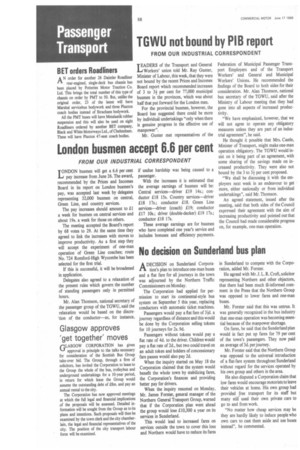No decision on Sunderland bus plan
Page 60

If you've noticed an error in this article please click here to report it so we can fix it.
ADECISION on Sunderland Corporation's plan to introduce one-man buses and a flat fare for all journeys in the town was adjourned by the Northern Traffic Commissioners on Monday.
The Corporation had applied for permission to start its continental-style bus system on September 5 this year, replacing conductors with automatic ticket machines.
Passengers would pay a flat fare of 30. a journey regardless of distance and this would be done by the Corporation selling tokens for 10 journeys for 2s. 9d.
Passengers without tokens would pay a flat rate of 4d. to the driver. Children would pay a flat rate of 2d., but two could travel on an adult token and holders of concessionary fare passes would also pay 2d.
When the inquiry started on May 18 the Corporation claimed that the system would benefit the whole town by stabilizing fares, the Corporation's finances and providing better pay for drivers.
When the inquiry resumed on Monday, Mr. James Forster, general manager of the Northern General Transport Group, warned that if the Corporation plan went ahead the group would lose £10,300 a year on its services in Sunderland.
This would lead to increased fares on services outside the town to cover this loss and Northern would have to reduce its fares in Sunderland to compete with the Corporation, added Mr. Forster.
He agreed with Mr. J. L. R. Croft, solicitor representing Northern and other objectors, that there had been much ill-informed comment in the Press that the Northern Group was opposed to lower fares and one-man buses.
Mr. Forster said that this was untrue. It was generally recognized in the bus industry that one-man operation was becoming essential because of the manpower shortage.
On fares, he said that the Sunderland plan would in fact put up fares for 79 per cent of the town's passengers. They now paid an average of 3d. per journey.
Mr. Forster said that the Northern Group was opposed to the universal introduction of a flat-fare system throughout Sunderland without regard for the services operated by his own group and others in the area.
He also disputed a Corporation claim that low fares would encourage motorists to leave their vehicles at home. His own group had provided free transport for its staff but many still used their own private cars to go to and from work.
"No matter how cheap services may be they are hardly likely to induce people who own cars to cast them aside and use buses instead", he commented.




















































































































































